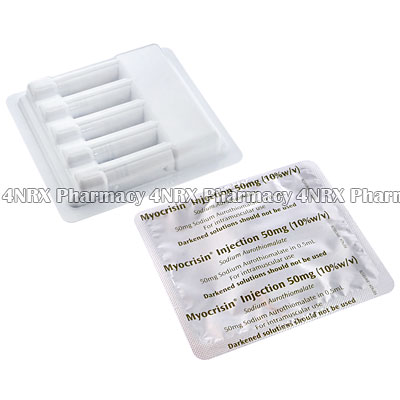 |
Home  Arthritis Arthritis  Myocrisin Injection (Sodium Aurothiomalate) Myocrisin Injection (Sodium Aurothiomalate) |
|
|||||||||
|
Myocrisin Injection (Sodium Aurothiomalate)
What is Myocrisin Injection (Sodium Aurothiomalate) used for? Myocrisin Injection (Sodium Aurothiomalate) is an injectable form of the precious metal gold, which is used to treat symptoms of rheumatoid arthritis. It slows down the reaction of the body's immune system which is responsible for causing pain and inflammation. This drug is a type of disease-modifying anti-rheumatic drug (DMARD) which, unlike painkillers, helps to slow the progression of the disease as opposed to just providing pain relief. How should I use Myocrisin Injection (Sodium Aurothiomalate)? Patients should never attempt to administer Myocrisin Injection (Sodium Aurothiomalate) themselves. This medication is injected by a physician or health care professional. The injection is usually given into a muscle, once per week or until your condition improves. Your physician may need to keep you under medical observation for 30 minutes after injecting the drug. It is important to attend all scheduled appointments with your physician, and not to miss any doses, as this may affect treatment. What are the side effects of Myocrisin Injection (Sodium Aurothiomalate)? Some side effects such as nausea, vomiting, dizziness and perspiration may occur soon after Myocrisin Injection (Sodium Aurothiomalate) is administered. Pain in the joints 1 to 2 days after the injection may also occur. Although rare, there are other more serious side effects associated with this drug. Consult your physician immediately if you notice:
Please Note Strictly follow all instructions provided to you by your physician or pharmacist while using Myocrisin Injection (Sodium Aurothiomalate). Optimum and safe dosage can differ based on the patient and the condition being treated. As this medication may be unsafe for certain patients, it is essential you always inform your physician if you are pregnant or breastfeeding, as well as if you have any allergies, other illnesses, or ongoing health conditions, especially kidney disease, blood disorders or lung conditions, and if you are taking any other form of medication, supplements, or herbal products. Immediately seek emergency medical care if you have an allergic or hypersensitive reaction. Common signs of a reaction include hives, swelling, skin rashes, chest pains, as well as trouble breathing or swallow. 

|
|||||||||||||||||